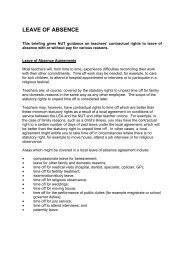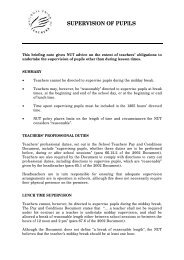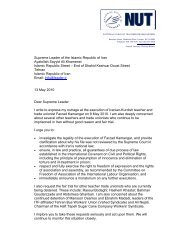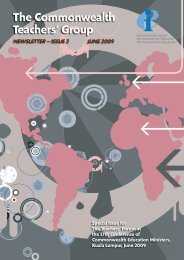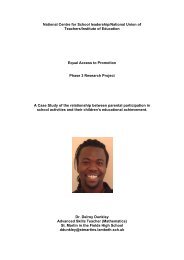Reducing Teachers' Workload â A Way Forward - National Union of ...
Reducing Teachers' Workload â A Way Forward - National Union of ...
Reducing Teachers' Workload â A Way Forward - National Union of ...
You also want an ePaper? Increase the reach of your titles
YUMPU automatically turns print PDFs into web optimized ePapers that Google loves.
In secondary schools, the picture was different. As might be expected, all secondary schools<br />
in the sample provided non-contact time <strong>of</strong> around two or three hours per week (increasing as<br />
teachers took on management and other responsibilities). Schools are also much more careful<br />
about ensuring that teachers receive some <strong>of</strong> this non-contact time; in most <strong>of</strong> the sample,<br />
arrangements for staff cover were designed to ensure that teachers never lost all their “free<br />
periods” however difficult the emergency.<br />
Marking and preparation<br />
Here again there was considerable commonality <strong>of</strong> view.<br />
We had hoped that the ratio <strong>of</strong> 1 hour’s marking and preparation for every two hours’ class<br />
contact, which had been recommended in the Implementation Report, might be reflected in<br />
current practice. However, although many interviewees acknowledged that the ratio <strong>of</strong> one<br />
hour’s preparation and marking for every two hours contact was a reasonable target most<br />
interviewees believed they did more. The more usual ratio was 1:1, across both primary and<br />
secondary schools.<br />
Why were teachers doing more than they believed was appropriate? The answers were many<br />
and varied, but a number <strong>of</strong> common themes recurred. These included:<br />
• the demands <strong>of</strong> SATs and external assessments generally<br />
• over-elaborate, and in teachers’ views unnecessary, detail in lesson planning and<br />
preparation<br />
• over-monitoring <strong>of</strong> pupils’ progress, leading to complicated and extensive monitoring<br />
records that were in many instances never subsequently looked at<br />
• a never-ending supply <strong>of</strong> revisions to syllabuses and curricula, and “initiative<br />
overload” generally.<br />
Lesson planning, preparation, and monitoring was seen as largely driven by OFSTED. What<br />
is interesting here is the variation in practice between schools. Some <strong>of</strong> this seems,<br />
particularly in primary schools, to depend on the confidence or even bull-headedness <strong>of</strong> the<br />
Headteacher. One headteacher interviewed informally in the margins <strong>of</strong> the fieldwork<br />
implied she had told OFSTED that the level <strong>of</strong> record-keeping would be lower than they<br />
might expect, but that the level was set by her and her Governing Body. The latter would be<br />
pleased to stand accountable for it in the context <strong>of</strong> a formal, specific discussion on the<br />
overall resource available for the school, and did the Inspector want her to arrange such a<br />
discussion ? At the other extreme, according to the reports <strong>of</strong> their staff some headteachers<br />
apparently believe OFSTED “required” highly elaborate minute-by-minute planning and<br />
subsequent recording <strong>of</strong> the detailed progress <strong>of</strong> the lesson, even though by those teachers’<br />
own admission this adds nothing to the value <strong>of</strong> the lesson delivered.<br />
Many teachers, and observers, also allege that individual OFSTED inspection teams vary<br />
widely in what they expect by way <strong>of</strong> plans and records when they visit schools. Schools<br />
therefore over-prepare in order to be sure that they are not caught at a disadvantage through<br />
being allocated a particularly zealous team.<br />
NUT/ATL 7 <strong>Reducing</strong> Teacher’s <strong>Workload</strong>




